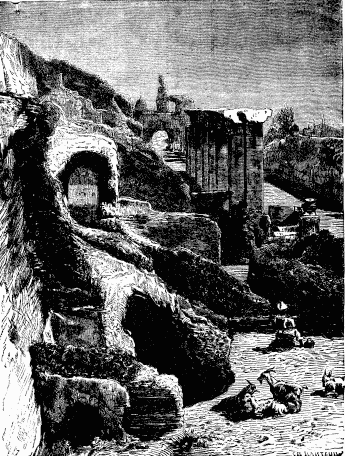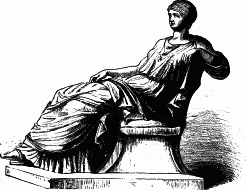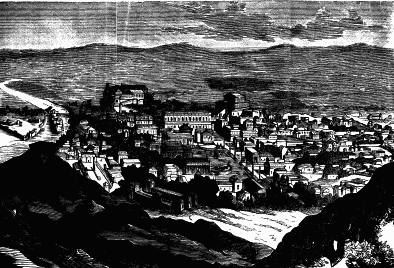
No difficulty was made about giving all the powers Augustus had held to his stepson, Tiberius Claudius Nero, who had also a right to the names of Julius Cæsar Augustus, and was in his own time generally called Cæsar. The Senate had grown too helpless to think for themselves, and all the choice they ever made of the consuls was that the Emperor gave out four names, among which they chose two.
Tiberius had been a grave, morose man ever since he was deprived of the wife he loved, and had lost his brother; and he greatly despised the mean, cringing ways round him, and kept to himself; but his nephew, called Germanicus, after his father, was the person whom every one loved and trusted. He had married Agrippina, Julia's daughter, who was also a very good and noble person; and when he was sent against the Germans, she went with him, and her little boys ran about among the soldiers, and were petted by them. One of them, Caius, was called by the soldiers Caligula, or the Little Shoe, because he wore a caliga or shoe like theirs; and he never lost the nickname.
Germanicus earned his surname over again by driving Arminius back; but he was more enterprising than would have been approved by Augustus, who thought it wiser to guard what he had than to make wider conquests; and Tiberius was not only one of the same mind, but was jealous of the great love that all the army were showing for his nephew, and this distrust was increased when the soldiers in the East begged for Germanicus to lead them against the Parthians. He set out, visiting all the famous places in Greece by the way, and going to see the wonders of Egypt, but while in Syria he fell ill of a wasting sickness and died, so that many suspected the spy, Cnæus Piso, whom Tiberius had sent with him, of having poisoned him. When his wife Agrippina came home, bringing his corpse to be burnt and his ashes placed in the burying-place of the Cæsars, there was universal love and pity for her. Piso seized on all the offices that Germanicus had held, but was called back to Rome, and was just going to be put upon his trial when he cut his own throat.

All this tended to make Tiberius more gloomy and distrustful, and when his mother Livia died he had no one to keep him in check, but fell under the influence of a man named Sejanus, who managed all his affairs for him, while he lived in a villa in the island of Capreæ in the Bay of Naples, seeing hardly any but a few intimates, given up to all sorts of evil luxuries and self-indulgences, and hating and dreading every one. Agrippina was so much loved and respected that he dreaded and disliked her beyond all others; and Sejanus contrived to get up an accusation of plotting against the state, upon which she and her eldest son were banished to two small rocky isles in the Mediterranean Sea. The other two sons, Drusus and Caius, were kept by Tiberius at Capreæ, till Tiberius grew suspicious of Drusus and threw him into prison. Sejanus, who had encouraged all his dislike to his own kinsmen, and was managing all Rome, then began to hope to gain the full power; but his plans were guessed by Tiberius, and he caused his former favorite to be set upon in the senate-house and put to death.

It is strange to remember that, while such dark deeds were being done at Rome, came the three years when the true Light was shining in the darkness. It was in the time of Tiberius Cæsar, when Pontius Pilatus was proprætor of Palestine, that our Lord Jesus Christ spent three years in teaching and working miracles; then was crucified and slain by wicked hands, that the sin of mankind might be redeemed. Then He rose again from the dead and ascended into Heaven, leaving His Apostles to make known what he had done in all the world.
To the East, where our Lord dwelt, nay, to all the rest of the empire, the reign of Tiberius was a quiet time, with the good government arranged by Augustus working on. It was only his own family, and the senators and people of rank at Rome, who had much to fear from his strange, harsh, and jealous temper. The Claudian family had in all times been shy, proud, and stern, and to have such power as belonged to Augustus Cæsar was more than their heads could bear. Tiberius hated and suspected everybody, and yet he did not like putting people to death, so he let Drusus be starved to death in his prison, and Agrippina chose the same way of dying in her island, while some of the chief senators received such messages that they put themselves to death. He led a wretched life, watching for treason and fearing everybody, and trying to drown the thought of danger in the banquets of Capreæ, where the remains of his villa may still be seen. Once he set out, intending to visit Rome, but no sooner had he landed in Campania than the sight of hundreds of country people shouting welcome so disturbed him that he hastened on board ship again, and thus entered the Tiber; but at the very sight of the hills of Rome his terror returned, and he had his galley turned about and went back to his island, which he never again quitted.
Only two males of his family were left now—a great-nephew and a nephew, Caius, that son of the second Germanicus who had been nicknamed Caligula, a youth of a strange, exciteable, feverish nature, but who from his fright at Tiberius had managed to keep the peace with him, and had only once been for a short time in disgrace; and his uncle, the youngest son of the first Germanicus, commonly called Claudius, a very dull, heavy man, fond of books, but so slow and shy that he was considered to be wanting in brains, and thus had never fallen under suspicion.
At length Tiberius fell ill, and when he was known to be dying, he was smothered with pillows as he began to recover from a fainting fit, lest he should take vengeance on those who had for a moment thought him dead. He died A.D. 37, and the power went to Caligula, properly called Caius, who was only twenty-five, and who began in a kindly, generous spirit, which pleased the people and gave them hope; but to have so much power was too much for his brain, and he can only be thought of as mad, especially after he had a severe illness, which made the people so anxious that he was puffed up with the notion of his own importance.

He put to death all who offended him, and, inheriting some of Tiberius' distrust and hatred of the people, he cried out, when they did not admire one of his shows as much as he expected, "Would that the people of Rome had but one neck, so that I might behead them all at once." He planned great public buildings, but had not steadiness to carry them out; and he became so greedy of the fame which, poor wretch, he could not earn, that he was jealous even of the dead. He burned the books of Livy and Virgil out of the libraries, and deprived the statues of the great men of old of the marks by which they were known—Cincinnatus of his curls, and Torquatus of his collar, and he forbade the last of the Pompeii to be called Magnus.
He made an expedition into Gaul, and talked of conquering Britain, but he got no further than the shore of the channel, where, instead of setting sail, he bade the soldiers gather up shells, which he sent home to the Senate to be placed among the treasures of the Capitol, calling them the spoils of the conquered ocean. Then he collected the German slaves and the tallest Gauls he could find, commanded the latter to dye their hair and beards to a light color, and brought them home to walk in his triumph. The Senate, however, were slow to understand that he could really expect a triumph, and this affronted him so much that, when they offered him one, he would not have it, and went on insulting them. He made his horse a consul, though only for a day, and showed it with golden oats before it in a golden manger. Once, when the two consuls were sitting by him, he burst out laughing, to think, he said, how with one word he could make both their heads roll on the floor.
The provinces were not so ill off, but the state of Rome was unbearable. Everybody was in danger, and at last a plot was formed for his death; and as he was on his way from his house to the circus, and stopped to look at some singers who were going to perform, a party of men set upon him and killed him with many wounds, after he had reigned only five years, and when he was but thirty years old.